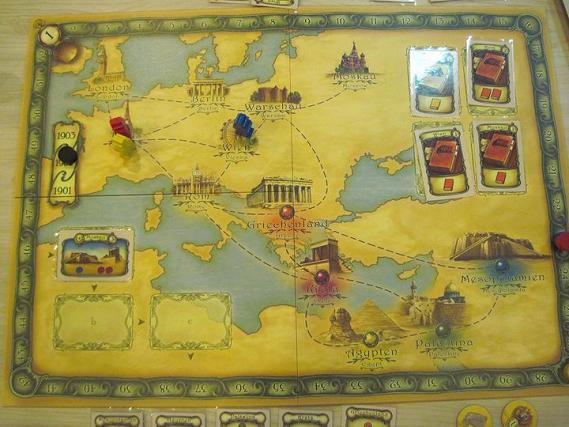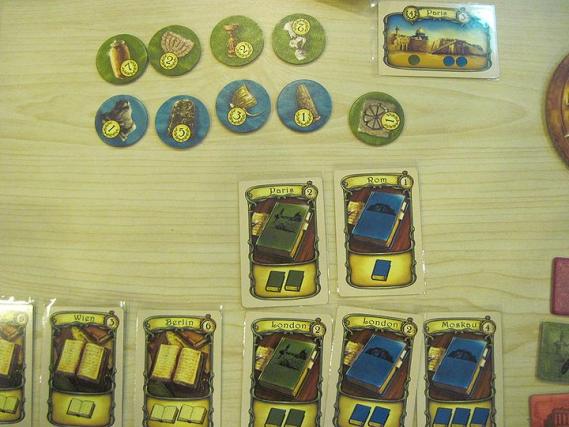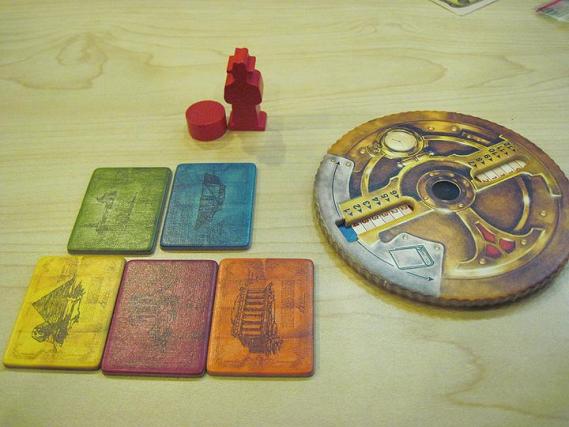
Thebes is a lighter weight game that we played recently. What’s particularly cool about this one is that it’s the rare euro game in which the game’s mechanics meshes with its theme perfectly. Here, the players take on the roles of archaeologists who compete against each other to win prestige and recognition. This is mainly accomplished by making some impressive finds at the dig sites but you can also earn some good points from organizing congresses. I suppose that means talking up your prestige.
When you dig in this game, it’s literal. The game includes four cloth bags corresponding with the different dig sites and different sets of tiles for each of them. Digs are carried out simply by blindly pulling out tiles from the cloth bags. If you snag an artifact tile, then it and the points printed on it are yours to keep. What is nasty is that each bag also includes a fair number of blank tiles, representing nothing but sand. Whenever these are drawn, they go back into the bag. Over time, as all of the good stuff gets dug out, obviously the proportion of sand tiles to artifact ones increases, making excavation of that particular site ever less enticing.
Of course, our intrepid archaeologists won’t go poking around the ruins of ancient civilizations without being suitably equipped and most importantly being well educated about the various sites. A deck of cards is used to represent the various tools, knowledge and other support stuff available to be picked up from the various cities on the map. In order to be eligible to excavate a site, the archaeologists must have at least one point of Special Knowledge of that color, though of course more is always better. General Knowledge can be treated as Special Knowledge of any color but can’t exceed the actual Special Knowledge of a particular dig site.

Other support cards include shovels which increase the number of tiles you can draw out of a bag when doing a dig and transport cards which can help to reduce travel time. The previously mentioned Congress Cards simply give the player who collects them extra points while the Exhibit Cards can be obtained only if you already possess artifacts of the appropriate colors and serve to give you a points bonus. The Congress Cards in particular are something to be careful about. While they’re worth only very few points in small numbers, their value goes up exponentially as you get more of them.
The central resource that this game uses is time and the game lasts for a fixed number of years. Basically everything takes time to accomplish, even traveling from one location to another on the map. This is represented by the track along the edges of the board. Whenever you spend time to do something, you move your player marker that many places. Learning General Knowledge for example takes a particularly long time, up to six weeks. This mechanic not only limits the number of actions you have throughout the game, but also determines player turn order. Whichever player has used the least time (is last on the track) is always the active player. This means that someone who has used a lot of time to do something might need to wait for a while before being able to act again.
Naturally, what needs the most time are still the actual excavations. Each player is given a “Time Wheel”, an ostentatious dial that you can refer to find out how many tiles you are allowed to draw out of the bag depending on your knowledge on that site and how much time you’re willing to spend there. In practice, I think players will all just use the maximum amount of time as it is the most efficient. This is compounded by the fact that you’re only allowed to dig the same site only once a year so you have an incentive to make the most out of your dig.

Overall, I found this to be a very fun game. Drawing tiles out of the bags is randomness at its purest of course, even if you have a nice reference chart to find out the tile distributions of each site, but drawing out the good stuff is still exciting and getting nothing but sand is a downer. The components are all excellent even if I did find the Time Wheel a bit gratuitous. It seems a great deal of effort was made in the interests of historicity as the artifacts are all based on real objects and the rulebook includes plenty of details about them. Most of all, the rules are very intuitive and do capture the feeling of racing against each other to get to the artifacts before they’re all gone (something that also amuses me because it’s a race that is today considered to be morally wrong and embarrassing to the major museums).
That said, there’s too little strategy in Thebes to obsess over it for long, making it something that you’d only want to pull out once in a long while. It’s probably a good candidate for the times when you have casual gamers or children around. I do note that it seems to take an inordinate amount of time to play given its relative shallowness, and might bore hardcore gamers who don’t see the appeal of randomness in games, especially since it’s quite possible for a lucky player to win against another one who has laid better plans.
One Response to “Thebes”
Trackbacks
Leave a Reply